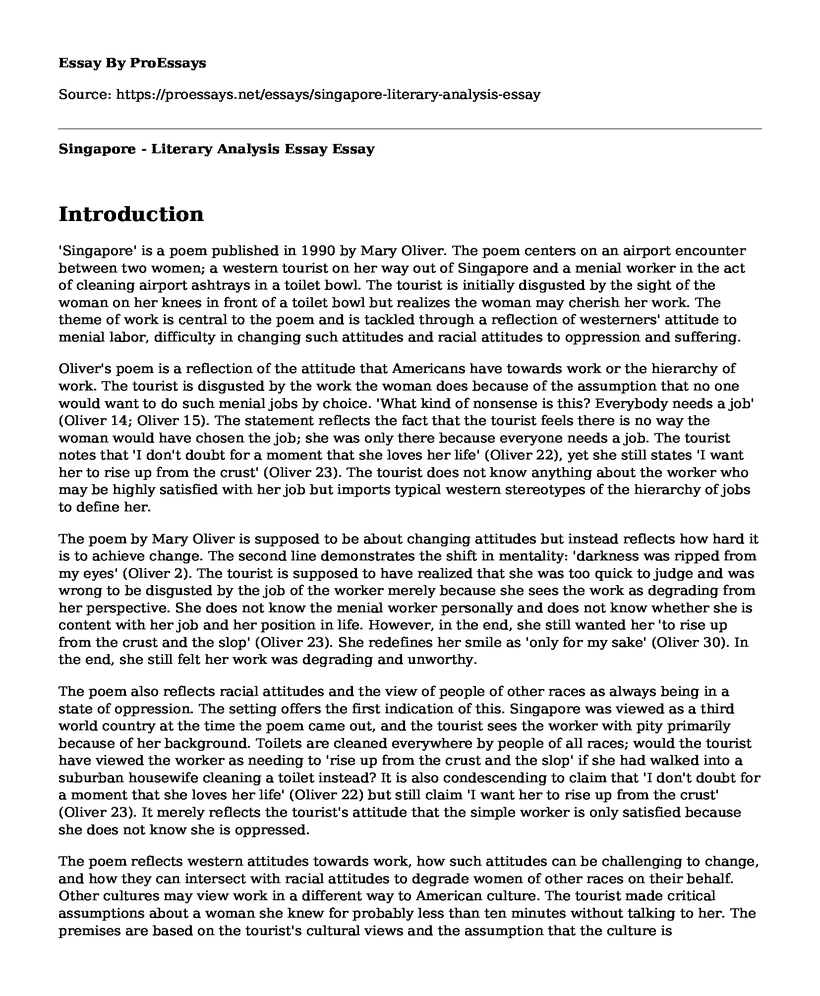Introduction
'Singapore' is a poem published in 1990 by Mary Oliver. The poem centers on an airport encounter between two women; a western tourist on her way out of Singapore and a menial worker in the act of cleaning airport ashtrays in a toilet bowl. The tourist is initially disgusted by the sight of the woman on her knees in front of a toilet bowl but realizes the woman may cherish her work. The theme of work is central to the poem and is tackled through a reflection of westerners' attitude to menial labor, difficulty in changing such attitudes and racial attitudes to oppression and suffering.
Oliver's poem is a reflection of the attitude that Americans have towards work or the hierarchy of work. The tourist is disgusted by the work the woman does because of the assumption that no one would want to do such menial jobs by choice. 'What kind of nonsense is this? Everybody needs a job' (Oliver 14; Oliver 15). The statement reflects the fact that the tourist feels there is no way the woman would have chosen the job; she was only there because everyone needs a job. The tourist notes that 'I don't doubt for a moment that she loves her life' (Oliver 22), yet she still states 'I want her to rise up from the crust' (Oliver 23). The tourist does not know anything about the worker who may be highly satisfied with her job but imports typical western stereotypes of the hierarchy of jobs to define her.
The poem by Mary Oliver is supposed to be about changing attitudes but instead reflects how hard it is to achieve change. The second line demonstrates the shift in mentality: 'darkness was ripped from my eyes' (Oliver 2). The tourist is supposed to have realized that she was too quick to judge and was wrong to be disgusted by the job of the worker merely because she sees the work as degrading from her perspective. She does not know the menial worker personally and does not know whether she is content with her job and her position in life. However, in the end, she still wanted her 'to rise up from the crust and the slop' (Oliver 23). She redefines her smile as 'only for my sake' (Oliver 30). In the end, she still felt her work was degrading and unworthy.
The poem also reflects racial attitudes and the view of people of other races as always being in a state of oppression. The setting offers the first indication of this. Singapore was viewed as a third world country at the time the poem came out, and the tourist sees the worker with pity primarily because of her background. Toilets are cleaned everywhere by people of all races; would the tourist have viewed the worker as needing to 'rise up from the crust and the slop' if she had walked into a suburban housewife cleaning a toilet instead? It is also condescending to claim that 'I don't doubt for a moment that she loves her life' (Oliver 22) but still claim 'I want her to rise up from the crust' (Oliver 23). It merely reflects the tourist's attitude that the simple worker is only satisfied because she does not know she is oppressed.
The poem reflects western attitudes towards work, how such attitudes can be challenging to change, and how they can intersect with racial attitudes to degrade women of other races on their behalf. Other cultures may view work in a different way to American culture. The tourist made critical assumptions about a woman she knew for probably less than ten minutes without talking to her. The premises are based on the tourist's cultural views and the assumption that the culture is fundamentally superior to that of the menial worker.
Works Cited
Oliver, Mary. Devotions: The Selected Poems of Mary Oliver. Penguin, 2017.
Cite this page
Singapore - Literary Analysis Essay. (2023, Apr 04). Retrieved from https://proessays.net/essays/singapore-literary-analysis-essay
If you are the original author of this essay and no longer wish to have it published on the ProEssays website, please click below to request its removal:
- Analysis of Alexander Pope's "An Essay on Man"
- Where Are You Going? Where Have You Been? by Joyce Carol Oates Essay
- Gender and Social Conflicts From the Works of Austin and Dicken Essay
- Article Analysis Essay on The Tale of Genji: A Fascinating Insight into Poetry's Greats
- Essay Example on 3 Poem Types: Theme, Form, Figurative Language
- Shakespeare: Love and Pain Through Poetry's Lens - Essay Sample
- The Ideas of Melancholy - Essay Sample







